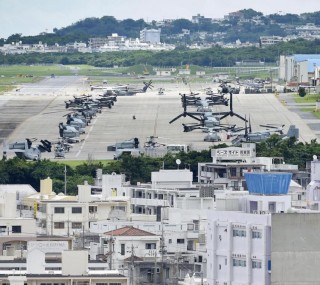Loading
Search
▼ Okinawa Governor Frustrated with U.S. Bases on 45th Reversion Anniversary
- Category:Event
NAHA - Okinawa Gov Takeshi Onaga expressed his frustration Monday over the continued large presence of U.S. military bases in the island prefecture as it marks the 45th anniversary of its reversion to Japan from U.S. military rule.
"Even after the reversion, (Okinawa) continues to suffer from incidents and accidents linked to U.S. bases, environmental and other concerns," Onaga said in a statement, calling the bases the "biggest impediment to development" in his prefecture.
In Okinawa, there is lingering resentment over bearing the burden of hosting the bulk of U.S. military facilities in Japan. Crimes linked to the U.S. bases are a source of constant grievance.
Despite the local community's hope of seeing its base-hosting burden significantly eased since the reversion, Onaga said Okinawa remains in a "difficult situation."
In May 1972, when Okinawa was returned to Japanese control, the area exclusively used for U.S. military facilities in the southwestern island prefecture covered about 27,893 hectares. As of January this year, the area had shrunk to 18,609 hectares, down around 33.3 percent.
Compared with mainland Japan, the pace at which bases are reduced in Okinawa is slow. Despite only accounting for 0.6 percent of the country's land, Okinawa holds 70.6 percent of the total acreage of U.S. military facilities in Japan.
Referring to a long-stalled plan to relocate the U.S. Marine Corps Air Station Futenma within Okinawa, Onaga said, "I will devote myself to tackling matters such as the bases issue to build a peaceful and prosperous Okinawa" for future generations.
Onaga, who opposes the plan, has demanded the Futenma base be moved outside of Okinawa, not transferred to a replacement facility to be built in the less-populated Henoko coastal area of Nago.
On Sunday, around 2,200 people gathered at the shore near Henoko to protest at the controversial plan, while protestors began a march on Friday for the same cause.
"We will not condone the (central) government's high-handed way of imposing the bases on Okinawa," said Fujiko Matsuda, a 77-year-old
Nago resident.
Tokyo and Washington agreed on the transfer in 1996, but the process has been delayed due to strong local opposition. The sea off Henoko has coral reefs and is home to the endangered dugong.
Despite such opposition, the central government began land reclamation work in Henoko on April 25. The government maintains the relocation is not opposed by all in Okinawa, and will continue to push for it to eliminate the risk of accidents posed by the base, now situated in a crowded residential area of Ginowan.
The central government's top spokesman defended its policy on Okinawa on Monday, citing improvements in economic indicators in the prefecture and an agreement with the United States to move a portion of the U.S. Marines in Okinawa to Guam.
Pledging the government's continued assistance to the people of Okinawa, Chief Cabinet Secretary Yoshihide Suga told a press conference that Tokyo will see through its promise to allocate 300 billion yen ($2.65 billion) for Okinawa's economic development in each annual budget until 2021.
© KYODO
"Even after the reversion, (Okinawa) continues to suffer from incidents and accidents linked to U.S. bases, environmental and other concerns," Onaga said in a statement, calling the bases the "biggest impediment to development" in his prefecture.
In Okinawa, there is lingering resentment over bearing the burden of hosting the bulk of U.S. military facilities in Japan. Crimes linked to the U.S. bases are a source of constant grievance.
Despite the local community's hope of seeing its base-hosting burden significantly eased since the reversion, Onaga said Okinawa remains in a "difficult situation."
In May 1972, when Okinawa was returned to Japanese control, the area exclusively used for U.S. military facilities in the southwestern island prefecture covered about 27,893 hectares. As of January this year, the area had shrunk to 18,609 hectares, down around 33.3 percent.
Compared with mainland Japan, the pace at which bases are reduced in Okinawa is slow. Despite only accounting for 0.6 percent of the country's land, Okinawa holds 70.6 percent of the total acreage of U.S. military facilities in Japan.
Referring to a long-stalled plan to relocate the U.S. Marine Corps Air Station Futenma within Okinawa, Onaga said, "I will devote myself to tackling matters such as the bases issue to build a peaceful and prosperous Okinawa" for future generations.
Onaga, who opposes the plan, has demanded the Futenma base be moved outside of Okinawa, not transferred to a replacement facility to be built in the less-populated Henoko coastal area of Nago.
On Sunday, around 2,200 people gathered at the shore near Henoko to protest at the controversial plan, while protestors began a march on Friday for the same cause.
"We will not condone the (central) government's high-handed way of imposing the bases on Okinawa," said Fujiko Matsuda, a 77-year-old
Nago resident.
Tokyo and Washington agreed on the transfer in 1996, but the process has been delayed due to strong local opposition. The sea off Henoko has coral reefs and is home to the endangered dugong.
Despite such opposition, the central government began land reclamation work in Henoko on April 25. The government maintains the relocation is not opposed by all in Okinawa, and will continue to push for it to eliminate the risk of accidents posed by the base, now situated in a crowded residential area of Ginowan.
The central government's top spokesman defended its policy on Okinawa on Monday, citing improvements in economic indicators in the prefecture and an agreement with the United States to move a portion of the U.S. Marines in Okinawa to Guam.
Pledging the government's continued assistance to the people of Okinawa, Chief Cabinet Secretary Yoshihide Suga told a press conference that Tokyo will see through its promise to allocate 300 billion yen ($2.65 billion) for Okinawa's economic development in each annual budget until 2021.
© KYODO
- May 25, 2017
- Comment (0)
- Trackback(0)


